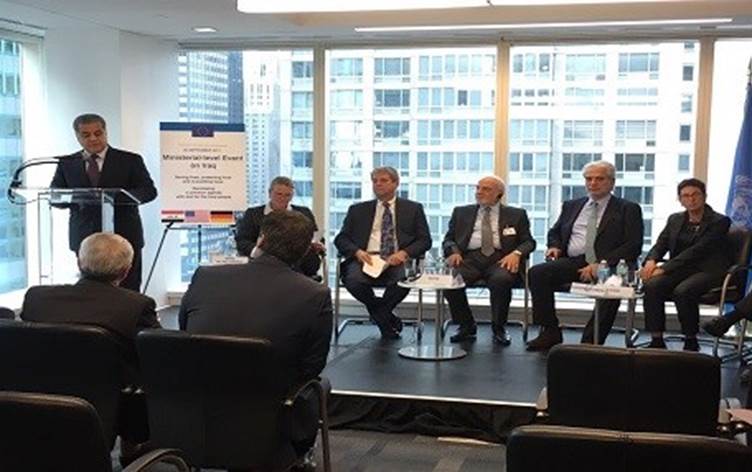NEW YORK — On the sidelines of the United Nations General Assembly in a ministerial-level meeting with high-level UN humanitarians, the Kurdistan Regional Government foreign minister highlighted the continued needs of refugees and displaced Iraqis in the Kurdistan Region. The FM also spoke with his counterpart from the UAE about the Kurdistan Region's independence referendum on Monday.
Falah Mustafa, the head of the KRG’s Department of Foreign relations, exchanged views with Sheikh Abdullah bin Zayed Al Nahyan, the Minister of Foreign Affairs and International Cooperation of the United Arab Emirates.
"Kurdistan has opened its borders and shouldered a huge responsibility, sheltering people of all faiths and ethnic background and providing a safe-haven for persecuted minorities," said Mustafa, according to his office's statement.
Through the war with ISIS, the Kurdistan Region has sheltered more than 1.8 million displaced Iraqis and Syrian refugees.
Mustafa highlighted that international non-governmental organizations (NGOs) and the UN are only covering 22 percent of the humanitarian needs in the Kurdistan Region.
The Kurdish and Emirati FMs also discussed "discussed security and political developments in the Middle East and Kurdistan Region’s Referendum on independence."
The UAE FM did not release a statement on the talks.
The ministerial-level event was entitled ‘Saving Lives and Rebuilding Lives: Developing a Common Agenda with and for Iraqi people.’
Hundreds of thousands Yezidis displaced from their homelands of Shingal remain displaced in Duhok Province, and many Christians and other minorities from Nineveh Province remain in the Kurdistan Region.
The KRG Minister called on the UN and international community to pay special attention to Shingal and Nineveh plains and to provide rehabilitation programs for the victims of ISIS, in particular women and children.
Iraqi Foreign Minister Ibrahim al-Jaafari also delivered remarks at the event, which was attended by Lise Grande, the UN humanitarian Coordinator for Iraq, and Christos Stylianides, the EU Commissioner for Humanitarian Aid and Crisis Management, among others including Mark Lowcock, the UN under Secretary-General for Humanitarian Affairs and Emergency Relief Coordinator.
Lowcock explained in a tweet that the next step for return in Iraq is protection.
Jaafari's office did not provide comments of his remarks at the humanitarian meeting; although, he separately met with
The Iraqi FM and Lowcock also met privately.
The statement from Jaafari's office on that meeting stressed that Iraqi forces have made sacrifices and shed blood for the sake of preserving the lives of civilians, who were under ISIS control.
It added that Lowcock praised the Iraqi government "in preserving civilian lives" and for its coordination with humanitarian organizations.
Lowcock will visit Baghdad soon to discuss providing more support and assistance, according to Jaafari's statement.
As of September 15, 3.2 million Iraqis have been internally displaced and 2.2 million have returned, per statistics from the International Organization for Migration.
ISIS still holds territory in the provinces of Kirkuk, Anbar, Diyala, and Salahaddin.



Comments
Rudaw moderates all comments submitted on our website. We welcome comments which are relevant to the article and encourage further discussion about the issues that matter to you. We also welcome constructive criticism about Rudaw.
To be approved for publication, however, your comments must meet our community guidelines.
We will not tolerate the following: profanity, threats, personal attacks, vulgarity, abuse (such as sexism, racism, homophobia or xenophobia), or commercial or personal promotion.
Comments that do not meet our guidelines will be rejected. Comments are not edited – they are either approved or rejected.
Post a comment